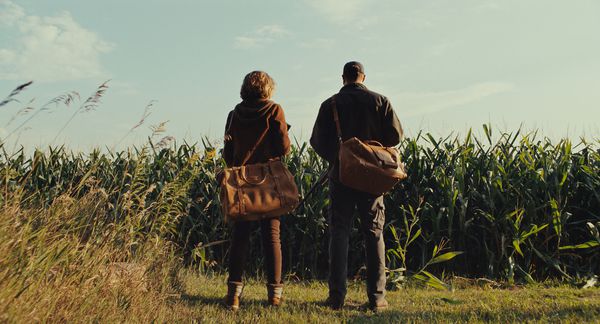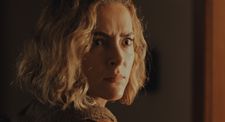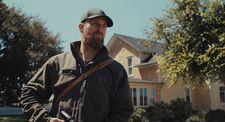 |
| Things Will Be Different |
A brother and sister, long separated, reconnect in order to pull off a heist, but nothing turns out quite as expected in Michael Felker’s festival hit Things Will Be Different. Starring Adam David Thompson and Riley Dandy, it sees the two take refuge in a house with a peculiar property: when its clocks are reset just so, it can travel back in time. They plan to use this to hide out in the late Seventies until the fuss has died down in their own time. When I met Michael, I told him that this seemed to me like a far more realistic use for time travel than most of what we see in films.
“I got the general world building ideas from when I used to visit my old family farm,” he tells me. “I would pick up household objects and antiques and go ‘This used to be modern at one time,’ like, put my head in that space. What was this used for, and how was it used? It gave me the sense that you can time travel just through everyday household objects. And then the more I thought about it, the more I thought about the rules and how it works – you know, I feel like one of the biggest things time travel should have in order for it to work is secrecy. It needs to be secret. So there's a lot of rules on how to hide it in plain sight. If time travel does exist now, it's somewhere around here and we just don't know it.”
There are similar themes in some of the films that he’s worked on previously as an editor with Justin Benson and Aaron Moorhead, so was it just a natural fit that they would be producing in this situation?
“Yeah, absolutely. I wrote the script wanting to go make it on my own. I didn't have any idea they would jump on board. But, you know, we worked as a hive mind, especially in the editing room, figuring out the tone and the feel, but also the character arcs and how to convey the world in the edit for all of their movies. And so when I made this, when I wrote the script and then sent it over to them to be like, ‘Hey, give me your blessing. Give me your thoughts and advice before I go make it,’ they jumped on and were like, ‘We just really like this. This is something we would do too. Let's work together on it.’ So they've been nothing but supportive of this type of weird cosmic horror movie.”
Heist movies usually stand or fail based on the group dynamics involved, so it’s interesting to see this focus on a brother and sister. I tell him that I like the fact that the film unfolds slowly, so we have time to observe and get to know them.
 |
| Riley Dandy in Things Will Be Different |
“Yeah, absolutely. I mean, I have a sister that I lost track of during the pandemic. We would try to find times to get on Zoom and catch up or fly to one of each other's places. But then time, you know, just moves on regardless of whether you make plans. So I wanted to explore this fractured sibling dynamic and this guilt that I harboured for not seeing my sister enough over the last five years, and put this in an unspoken, secret language. You get to know the brother and sister really well just because they click together in some ways that are very mechanical and really, they speak the same language. But when it comes to actually loving each other and forming a genuinely deep relationship, they push and pull constantly. I think that's really important to wrestle with when you're working with brother and sister dynamics.”
One then has to bring the audience into that relationship as well.
“Yeah. I think it was really important to have those scenes. There's the opening diner scene where they're joking about how much they actually really know each other based off of Sid's daughter, or when they're playing the weird game and drinking before they start going back to their regular time. Those moments, I think, are so important because if you don't have those, you have just a big, heady time travel movie, and it's only worth it if you care about who you're following and are interested to see where they're going to go. Otherwise, you're at the mercy of some people just not emotionally engaging with it.”
It helps that there’s a really good dynamic between the two leads.
“Yeah. The casting came from Rustic Films. Justin Benson and Aaron Moorhead hooked me up with a casting director named Chrissy Ellington, who found Joseph and Sid, which was Adam David Thompson and Riley Dandy. We had a big, extensive casting process for those two roles, but they were, at the time, top of the list already. Not just because they were the best individual people for those roles, but they had a great chemistry with each other, and we really got along. They're both down to earth people, while also being insanely talented, and they made my job really easy, especially when it came to the rehearsal process.
“We all don't live in the same city, so we had to get on Zoom before we met each other on set, and we would just talk for hours on Zoom, just being like, ‘Hey, how was your day? Hey, what bugs you? Hey, what's something that you've been really excited about?’ And we really got to know each other on a granular level. So eventually I would leave those Zoom rooms, and then those two would actually just keep talking on their own, developing their own brother and sister secret language. So that way, when we got on the set and things happened like, you know, ‘We’ve got to move this light,’ or ‘Hey, we're running behind so everyone's got to pick up the pace,’ they could look to each other and know that they’d got each other's backs. So they were doing things that were so lived-in, even in the first take, and it made my job as a director a lot easier.”
There’s one really big challenge presented by the script here, and that’s the sudden shift from summer to winter that sells the time travel element. Did they just have to have two completely separate shoots?
“That's absolutely 100% correct. The big magic trick was just waiting for corn to grow, so we shot all of the winter stuff first in February of 2023, and then we came back in August of 2023 once the corn had gone above – I think Adam is six foot three, so the corn had to be seven to eight feet tall. So we had to wait for it all to grow, and hopefully everyone would come back and do it all again for at least another week. And thankfully, they all did, because as stressful as the shoot could be with winter elements and Covid, we all really felt like family.”
 |
| Adam David Thompson in Things Will Be Different |
There’s some stunning cinematography in there. How much was that a part of making the magic work?
“Oh, 100%. That’s one of the most important things. I’ve worked with my DP, Carissa Dorson, for such a long time. I've known her since film school, two decades ago. The big thing that we did was we had a big lookbook proposal on how everything should come together. It was a lot of not just time travel movies, but also rustic-looking movies like Looper and even like noir movies. The Assassination Of Jesse James was like a big one.
“We wanted to feel like you're part of the house, like you're in the house. Just warped glass windows and just light being motivated from outside to really give it a cold, desperate feel.
“One of the things that we did to really make sure that look was pulled off was the week before, pre production week, Carissa and I went to the location by ourselves and story photo boarded the entire movie. We didn't even do storyboards, so I would just stand in for the actors. She would pull out her phone with an app that would tell her all the metadata she would need, and then we tried out different shots. That way we knew where the camera could be, where the light could be motivated well before we got to set. So that way when we got to set, and we had our big group meeting every day, we would just pull up the photo board with all the information.
“That way, Carissa could go and be with her gaffer and really shape the lighting. And then I could be with the actors and go over the moment really quickly with them. It's why the movie looks as good as it is. I think Carissa is incredibly talented. I'm so lucky to have her.”
We discuss how his team went about recreating the Seventies in the film, and I say that it seems to me that's something that comes across in the style of the actual shooting as well as in the wonderful decoration in the house and the odd little bits and pieces we see there.
“That's a great observation,” he says. “I think it's the shooting style. Even though we didn't have the capacity to shoot on film, we wanted to be like we're locked off the camera. We wanted the camera to feel as still and contained as possible. That way, when you see a picture, you really can take it in. But also, even in moments of stressful, tense situations, we wanted to feel that claustrophobia. The camera is so locked off that it could make moments of tight closeness feel like it's pounding on my chest. Or you can have insanely huge wides where everyone looks like ants across like a field, and that makes us feel pretty helpless in a very cold and dire situation.
“A lot of my experience as an editor was just realising that the more specific you can be with your choices while you're on set and confident knowing how to cut it together, the more it's going to really play into the look and atmosphere and emotion of your film. And so finding that old classic style and using it to really emphasise isolation and horror, it really helped us get where we needed to make the movie.”
So how does he feel about the way it's been received?
“Oh, it’s really fascinating. I am loving it. It's a movie that reflects whatever the audience wants to give. If you really put yourself into it, the movie is incredibly rich and rewarding, but it does ask a lot from its audience so some people might push and pull away. I think it's been the most fascinating thing to travel with the movie and talk to people for a long time afterwards. People really want to talk about this movie, and I'm happy it's a creative discussion.”





















